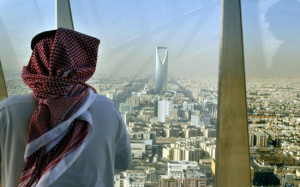
According to many politicians, including the Americans, Mr. Obama’s Administration hopes to “turn the page on the prolonged drama”, recognizing Iran as a regional superpower and shifting all the responsibility for the fate of the Middle East onto it. After all, the United States, experiencing the shale revolution, will soon overcome its dependence on Middle East oil. That is why it would be unwise to keep to the old system of alliances, which requires tremendous efforts of Washington and major investments in the region.
Recently Riyadh has quite clearly understood and it will need to respond to modern challenges alone, especially in the foreign policy sphere. Subsequently, the USA was accused of treason – but this did not help. Then the Saudis sent their rising star, Prince Bandar bin Sultan, to Moscow and tried to bribe Vladimir Putin with sweet promises – but this attempt fell pitifully flat. After that, the Saudis started reformatting, where possible, their doctrines, in order to develop the foundations of a new policy. The process continues with varying degrees of success.
First of all, this affected Egypt, where in spite of the Americans, the legally elected President Mohamed Morsi was overthrown with Saudi money. I would say that in this case, the Saudis have been more farsighted and professional than the crowd of American political scientists and politicians. The Egyptian Army actually took advantage of popular protest to preserve its power, which belonged to it in Egypt ever since 1952, when Colonel Gamal Abdel Nasser carried out a military coup.
It is understandable that after the overthrow of M. Mursi and the military coming to power, Riyadh began giving huge sums of money to Cairo. And as the saying goes, he who pays the piper calls the tune. Besides the Americans, the Saudis’ rival, Qatar, which relied on M. Mursi and the Muslim Brotherhood organization, was knocked out. Incidentally, it should be recalled that the Muslim Brotherhood is a political and religious Pan-Islamic Association. It was founded in 1929 from a small group, set up in 1928 by a teacher, Hassan al-Banna, in Ismailia (Egypt). The goal of the organization was the proclamation of society’s Islamization and the creation of an Islamic state.
In its turn, official Cairo offered a small gift to Riyadh by arresting twenty journalists of Al Jazeera, a Qatari TV channel, who appeared in court on charges of being members of a terrorist group, aiding terrorists and spreading false information that endangered national security. The prosecutors noted that all these “journalists” assisted “terrorist organizations”, by spreading false information. They “distorted the information” that “helped the terrorist groups achieve their goals and influence public opinion”, the statement said.
Simultaneously, Riyadh fears that various terrorist groups that are now active in the neighbouring Syria, Iraq, Egypt and Lebanon might sooner or later return to Saudi territory. Moreover, these rebels will have good combat experience and will be ideologically prepared. There was a precedent for this in Saudi Arabia, when in 2003 and 2006, Al-Qaeda carried out terrorist attacks in the territory of the Kingdom.
Trying to prevent such a threat, Saudi Arabia demanded from the kingdom’s citizens fighting overseas, and members of terrorist groups, to return home within two weeks. Experts in the field of Middle East policy indicate that the ultimatum is primarily directed towards citizens of Saudi Arabia, who are in Syria, as part of the terrorist groups fighting against President Bashar al-Assad.
Saudi Arabia’s Interior Ministry said that the list of groups was prepared by a special commission, composed of representatives of the Ministry of Internal Affairs and diplomats, religious leaders, prosecutors, and others. It was also noted that this list is not final and may be enlarged by other groups. It is noteworthy that the leadership of Saudi Arabia announced as terrorists such groups as the Muslim Brotherhood, Islamic State of Iraq and the Levant, en-Dzhebhat Nusra, Al-Qaeda and the Hezbollah Lebanese Shiite organization. Taking into account that the Egyptian organization Muslim Brotherhood is included on this list, we should note that the government of the Kingdom is serious in its attitude to the threat from Egypt, which is becoming a new ‘hot spot’ in the Arab world. It should be noted that Qatar has been actively supporting Islamist forces operating in the Middle East, such as the Muslim Brotherhood, various Syrian extremists, the Palestinian Hamas movement and other similar organizations.
The statement of Saudi Arabia was made on the background of a diplomatic scandal in Qatar: the Kingdom, as well as Bahrain and the United Arab Emirates withdrew their ambassadors from Doha, accusing Qatar of supporting terrorists and interference in their internal affairs. At the same time, UAE, Bahrain and Saudi Arabia stressed that they support “all the countries of the Cooperation Council for the Arab States of the Gulf (GCC), including the people of Qatar.”
Qatar’s disagreements with its neighbours are mainly based on their different attitudes to the Egyptian Muslim Brotherhood movement. While Doha supports the banned organization in Egypt, the other Arab Gulf countries are against it, and are helping the current military government of Egypt. Moreover, Saudi Arabia, which dominates in the Arabian Peninsula, is trying to completely thwart the influence of Qatar in Syria, in order to determine on its own the Arab position towards Bashar al-Assad’s regime.
Apparently, in the near future, some new events will occur in the Gulf Region and Riyadh (on the eve of Barack Obama’s visit) will present new initiatives to give the royal regime more respectable appearance on the world stage.
Viktor Mikhin, member of Russian Academy of Natural Sciences, exclusively for the online magazine “New Eastern Outlook”
